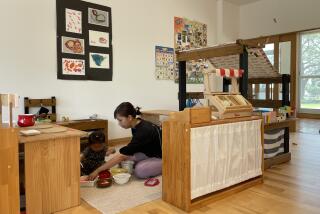Family Remains Stable : In Japan, the Wives, They Are a-Changin’
TOKYO — Her grandparents were married after a single meeting arranged by a go-between. Her parents also were introduced by a go-between, although they fell in love before they were married a year later.
But Kazuko Sato, 23, is not interested in an arranged marriage. A few weeks ago she turned down a meeting with a proposed husband, a young civil servant with a degree from Japan’s most prestigious law school, without even looking at his photograph.
Sato graduated from college last April, with a major in philosophy, and she is dating a young businessman she met when he was still a student. And she said she is trying to acquire a skill of some kind before she gets married.
“Otherwise, I would be totally dependent on my husband,” she said.
Husbands and Housework
This statement, made at a dinner with her parents, grandparents and friends, was radical enough in a country where tradition dictates that a woman depend on her husband--neither Sato’s mother nor grandmother has ever held a job. But a moment later one of the friends suggested that what Sato ought to be looking for is a husband who will help with housework and raising children.
“It’s the unwillingness of husbands to lift a finger around the house that makes it so difficult for wives to work,” the friend said.
A silence fell over the room.
Then Sato’s grandmother, 74, spoke up. Casting a mock glare at her husband of 53 years, she said, “Well, I wonder what I should teach him first? Probably it ought to be how to turn on the gas range.”
The group exploded in laughter, led by Sato’s 80-year-old grandfather.
Sato, however, may take the friend’s advice. And next year she plans to go to Europe to study the skill she is looking for, metalworking and jewelry design.
The Satos--not their real name--typify the change that has taken place in the Japanese family since the time, before World War II, when social customs, and some laws, made the father an authoritarian ruler, prescribed rigid obligations for children and discriminated against women seeking divorce.
Although 87% of Japanese men and women still believe the husband’s role is to provide a living, according to a poll taken for the prime minister’s office, the reality is that more than half of all married women now work outside the home to augment the family income.
Children still have little time for play. The hours that before the war were filled with work on the family farm or in the family business are now filled with homework, cramming for tests to take advantage of new opportunities for higher education. Nonetheless, life at home has become far less rigid for children, to the extent that many critics are now calling for sterner discipline.
Stability Unshaken
And no longer is the arranged marriage the norm, as it was as recently as 1960.
Yet the stability of the family as a social institution is remarkably unshaken, defying almost every family trend in the United States.
The divorce rate is still low--less than a third of that in the United States, and even lower than in France, where religion is a restraining factor. People with more than one divorce are rare here.
Japan’s divorce rate, after rising for 20 years, declined in 1984 and again in 1985--to 1.39 divorces per 1,000 people, compared with 1.59 in France and 5.0 in the United States.
The three-generation family, a hallmark of prewar Japan, has dwindled to less than a fifth of all families, but when an aging parent needs help, it is usually provided.
Child abuse is virtually nonexistent. Spoiling children is the problem here, Prof. Sumiko Iwao of Keio University said.
While childbearing among unmarried women in the United States has skyrocketed since the end of World War II, it has dropped sharply in Japan.
According to the National Center for Health Statistics in Washington, births out of wedlock in the United States reached their highest level on record in 1984, when almost one of every five babies was delivered by an unmarried woman. In Japan, the figure for 1983--statistics for later years are unavailable--was less than one in 100.
Sex between high school students, even dating, is rare here. In the United States in 1981, the latest year for which such statistics are available, there were 524,000 babies born to girls between the ages of 15 and 19, and 80% of those babies were born out of wedlock. In Japan, a nation with only half the U.S. population, the comparable figures were 18,242 babies and 8.5%, according to the Alan Guttmacher Institute of New York, which specializes in family planning research.
In the United States that year, abortions in the same age group outnumbered those in Japan by nearly seven times in relation to population; in absolute number, by nearly 19 times.
Juvenile delinquency--petty theft and violence in the schools--is on the rise in Japan, but it is still minuscule by American standards.
Social scientists here who are familiar with trends in the American family believe that the Japanese have avoided deterioration of the family mainly because their approach to sex and marriage is very different from the American approach.
For example, as in much of the rest of Asia, there is intense social pressure to marry and to avoid divorce.
“Some Japanese marry to be considered a full-fledged member of society,” Prof. Iwao said. “Some marry to win the trust of society. Nearly all expect marriage to last a lifetime.”
By the time the average Japanese marries, he or she is also more likely than an American to be a mature adult.
“Japanese do not romanticize marriage,” said Tatsuya Ito, a demographer at the Health and Welfare Ministry’s Institute of Population Problems.
According to Ito, the Japanese decide whether a potential mate is suitable the way the police decide whether to suspend or revoke a traffic violator’s driving license--by subtracting points.
“Perfection is ruled out from the beginning,” he said.
A great number of considerations figure in the subtraction list. Polls that ask Japanese what they want in a spouse always find education and family background at the top of the list. Also, a man two or three years older than the woman is desirable. For women, the man’s occupation ranks high.
Men and women alike rate physical attraction as only a minor consideration.
Takako Sodei, an associate professor at Ochanomizu Women’s University, Japan’s top university for women, said most of the students there “still want to depend on a man.”
“Students here find a Keio University man the most fun,” she said. “But when it comes to prospects for the future, the men they marry are from Tokyo University.”
Keio is a good private school, but Tokyo graduates win the jobs with the greatest prestige.
For men and women in elite universities and in elite jobs, she said, the arranged marriage continues to predominate.
About the only trend that the Japanese share with Americans is a tendency to get married later in life and to have fewer children. As in the United States, wife-beating is a problem, but the subject is such a social taboo here that detailed study of it has been effectively barred.
After marriage, family life in Japan seems to have virtually nothing in common with family life in the United States.
Every night after work, almost 70% of Japan’s middle-level business executives go out drinking with colleagues or customers. The average businessman’s family has dinner together only three times a week.
For many husbands, Iwao said, “home is little more than a boarding house.”
Even long separation caused by a change of jobs is accepted as natural. An estimated 360,000 fathers in the 30-to-59 age group are living alone, and some have been doing so for as long as three years. Rather than move the family to a new city, these men and their families choose separation, usually to avoid disruption in the children’s education.
Ito said that when he was studying for a year in Hawaii, he was surprised at how often he was asked why he had not brought his wife along. The answer was that she could not get leave from her job.
“Americans seem to feel that if husband and wife are separated for several months, each will go his own way,” Ito said, “but in Japan the feeling is that once you’re married, you’re married.”
Men rarely discuss their work with their wives, and the women do not often inquire. Wives are almost never included at business dinners, much less asked to be the hostess. Most would be terrified by the prospect.
Working wives expect--and get--little help from their husbands at home. And they still regard the home, not the job, as the focal point of their lives. Most take only part-time work, Prof. Sodei said, because it allows them to continue caring for their children and their husbands.
Within the home, however, the wife occupies a central position. More than 80% manage family finances, often to the point of fixing a monthly allowance for their husbands. They also supervise the children’s education.
None of this apparently leads to unhappiness. Indeed, according to the poll carried out for the prime minister’s office, 90% of married people say they are “satisfied” or “more or less satisfied” with their family life.
The vast majority of husbands and wives support this division of roles. And both enjoy spending time with members of their own sex--and not being forced to do everything together, Iwao and Sodei agreed. Both professors are women, and both are married.
Japanese regard as strange what Iwao called the “couple culture” of the United States.
“To believe that two people raised in different environments have to do everything together is asking too much,” she said.
Less time spent together helps to avert friction, Iwao said. After an exhausting family vacation, men often say they are glad to get back to the office.
Reiko Kitadai, a divorce counselor who has combined raising three children with various jobs that have been interrupted by two periods of residence in the United States when her husband was assigned there, said that Japanese women are not angered by husbands who get home late.
“Many wives,” she said, “are embarrassed in front of neighbors if their husbands get home too early. It’s only the men who have no future in their jobs who get home in time for dinner.”
Stories of frustrated housewives indulging in secret daytime affairs and awaiting the day their children leave home to get a divorce abound in magazines and on television, Ito, the Health and Welfare Ministry demographer, said. But in reality the divorce rate among all age groups remains constant and is “amazingly” low, he said.
“Infidelity by wives exists mainly in TV dramas,” Prof. Iwao said.
Where men are concerned, Japan’s social ethic holds that sex is one thing and marriage another. This is reflected in the thriving “sex industry”--hotels and motels, Turkish baths, hostess bars. Many wealthy men--politicians, businessmen, entertainers--keep a mistress with impunity.
The family in Japan, Prof. Sodei said, is the foundation of everything a person does--but as long as the precincts of the home itself are not violated, what goes on outside does not matter. Only when a man takes up with a woman who is socially equal or superior to his wife, she said, will he injure his wife’s pride and anger her. In general, infidelity is not one of the more common reasons cited for divorce here.
Still, there are unhappy marriages, and their existence has given rise recently to the phrase “divorce within the home.” It occurs even in families with an outward appearance of bliss and happiness.
One wife recently revealed to a stunned family friend of more than 20 years’ standing that her husband often beats her severely.
“Kazuhiko (not his real name) is a totally different person outside the home,” she said. “There have been countless times when I wanted to divorce him. Life with him has been a living hell. But I haven’t done it because of the children.”
Children, nearly all parents here agree, provide the glue that holds the marriage together. According to Sodei, when Japanese are asked which is more important, spouse or children, they almost invariably say the children. Americans usually say the spouse.
In the poll done for the prime minister’s office, only 29% of respondents thought that family life should center on the husband and wife.
The baby sitter is all but unheard of in Japan. Couples rarely go out together until after their children are old enough to look after themselves.
“In the United States, marriage is an individual affair. In Japan, it is a family affair,” Prof. Sodei said.
Prof. Iwao said: “Americans think that unhappy parents will raise unhappy children. Japanese think it is better for the children’s future if they remain together.”
“In terms of the effect on society as a whole,” Sodei said, “at least as politicians would look at it, certainly the Japanese system provides better stability. The savings in social security costs to the government--such as caring for divorced mothers and their children--are huge.
“Americans at least do not deceive themselves, although whether they are happy or not is another matter. In Japan, many deceive themselves and cheat their families for the sake of outward appearance. But it does enable them to live their lives smoothly in society.”
On the whole, the average home with a salaried employee as the breadwinner is a happier place than it was in prewar days, when most fathers were shopkeepers or farmers and parceled out chores to the children.
Keiko Higuchi, a women’s affairs commentator, wrote recently: “Family life never used to be considered fun. To be part of a (prewar) family entailed both hard work and modest behavior.”
New problems have arisen, she continued, but “today the home has been transformed into a place for the pursuit of happiness.”
Kitadi, the divorce counselor, said she believes that most Japanese couples share the same affection for each other that happily married American couples have. A big difference, however, is that Japanese seldom verbalize it, she said.
“In America, it seems as if a husband or wife needs to be told ‘I love you’ every day,” she said. “In Japan, if a wife asks her husband if he still loves her, she is likely to get an answer like, ‘What kind of stupid question is that?’ ”
More to Read
Sign up for Essential California
The most important California stories and recommendations in your inbox every morning.
You may occasionally receive promotional content from the Los Angeles Times.










